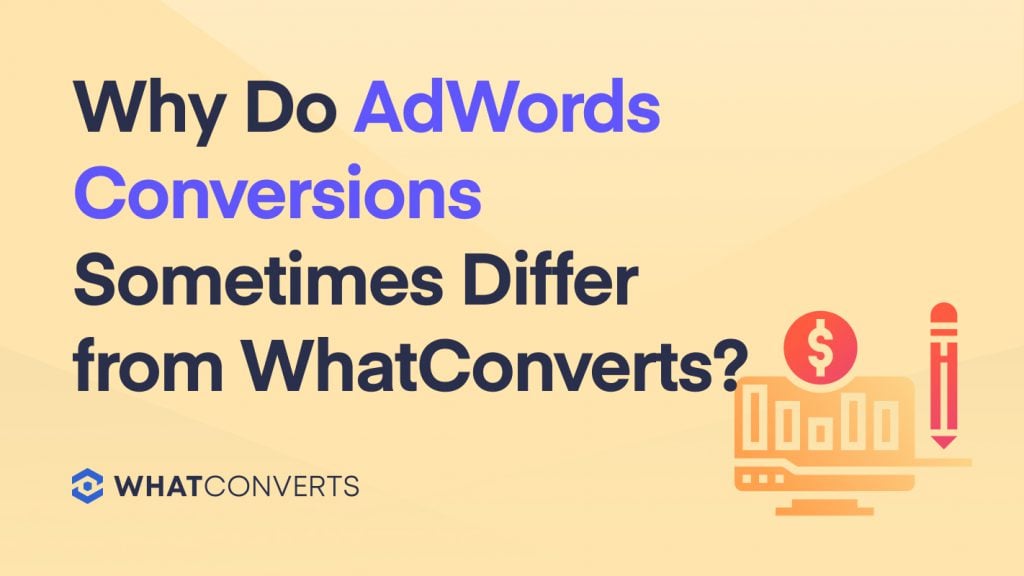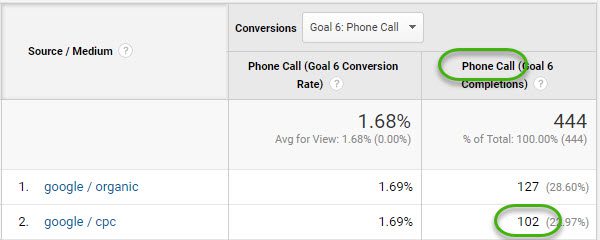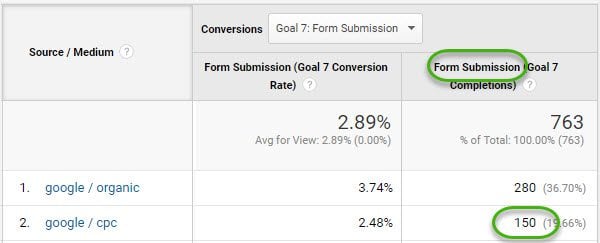
When it comes to your pay-per-click (PPC) campaigns in AdWords, you might notice data discrepancies with native integrations that are directly linked to your Google AdWords account. Even when you're importing your clicks and events from Google Analytics, you can still find discrepancies (an issue well documented by Google).
The question of when your data doesn't line up becomes not "Why aren't my conversions here" but "Which data set is correct?"
WhatConverts works as a stand-alone lead tracking software, and also hand-in-hand with Google AdWords and Analytics to make sure that you never lose a lead. With WhatConverts, you get the missing pieces of the conversion puzzle that are not available in AdWords. Let's consider a phone call that is being tracked in AdWords, compared to a phone call in WhatConverts. Within AdWords, you know that a conversion action happened, (a phone call) and you will know which campaign, ad and keyword were responsible. What is missing is: Was it a good or bad call? Who called? What did they want? What is the value of what they wanted? In WhatConverts, you get to see the conversion, the marketing responsible and you get to see the who, what, where and how much.
Below, we have screenshots with conversion data from the same website to demonstrate the differences in conversion data. We used a date range of 6 months (January 1, 2018 to June 30, 2018) to give a large enough time frame to see the full discrepancy due to the attribution window differences. Let's look at the data and then talk about why there are differences:
WhatConverts Conversions:
In WhatConverts, we can see that Google/cpc (AdWords) received 108 phone calls and 156 form submissions, with a total of 264 conversions. In this view, we are looking at 'All Leads', instead of 'Unique Leads'.

Adwords Conversions:
Inside the company's AdWords account, we see a total of 217 conversions. There is a huge discrepancy between WhatConverts and AdWords data, a 17.8% difference! 47 less leads are recorded in AdWords.

Google Analytics Goal Conversions:
In Google Analytics, our acquisition reports we see 102 Phone Call conversions.

We also see 150 Form Submission conversions, giving us a total of 272 conversions. Comparing Google Analytics to the 264 leads in WhatConverts, we see a 2.9% difference.

Let's Discuss These Differences and How they can Happen
Now that we have seen real data from leads compared with AdWords and Analytics conversions, it can be worrisome when the number of conversions between AdWords and WhatConverts don't match up. Why are there more conversions in AdWords than WhatConverts, or vice versa? Managing your marketing requires you know that the data you are using to make decisions is reliable, and you also understand what it represents.
At WhatConverts, we've studied why conversions can differ; it boils down to 5 main reasons (click for detailed explanation):
- Duplicating Adwords and Analytics Goal Conversions
- Conversion Window is too Small
- How AdWords is set to Record Conversions
- Attribution Model
- Google AdWords Time of Conversion Import
Let's look at a few examples to demonstrate:
Example 1:
A user clicks on an AdWords ad and visits the website you are tracking with AdWords and WhatConverts, but they leave the website without taking a conversion action (like placing a phone call or submitting a form). Thirty-one days later this same visitor returns, but this time they search for the company's name and arrive on the website through a Google Organic result, they make a phone call to get a quote.
In this scenario, if the AdWords conversion window was set to the default 30 days and the attribution method used was 'last click', inside your AdWords dashboard, this phone call would not be attributed as an AdWords conversion, so it would be a zero conversion in this case. WhatConverts would track this call as a google/cpc (AdWords) lead and assign it to the original ad click, campaign, keyword and ad. The reason being, WhatConverts uses 'first click' attribution and our conversion window does not expire. We believe the first method used to get a visitor to a website is the most important.
Example 2:
A user clicks on a Google Organic search result and arrives on the website you are tracking with AdWords and WhatConverts, they leave the website without taking a conversion action (like placing a phone call or submitting a form). Five days later this same visitor returns, but this time through an AdWords click; they make a phone call to buy a product. In this scenario, AdWords would track the 2nd visit as an AdWords conversion. WhatConverts would track the visitor as a Google Organic conversion, as that was the first method used to get to the website.
Example 3:
A user comes to your site through an AdWords ad, but takes no conversion action. Five days later, they visit your site through a Facebook post and still take no conversion action, 17 days later they pull up your website from their browsing history visit (a direct visit) and submit a form to request more information about a service you offer. Without WhatConverts, the conversion would not be counted in AdWords since the last visit was from a referral link from Facebook. However, with WhatConverts, AdWords would receive the conversion count from WhatConverts, and the information from the form would be saved to follow up on the lead.
As you can see in the above examples, there are many scenarios that could cause discrepancies in the conversions between AdWords and WhatConverts conversions.
What Data Set Should You Trust?
There is one main reason we believe the WhatConverts data is more reliable as a lead tracking platform; inside WhatConverts, you see the actual lead with full marketing information. In Analytics and Adwords, all you know is that a conversion action took place. Only WhatConverts can tell you if the conversion good, bad or an existing customer. Now that you can see the underlying data, you can accurately see what marketing is working. In AdWords, you're trying to evaluate marketing using blind conversions. We've seen agencies counting spam calls as leads, when they were merely nuisance calls.
AdWords reporting offers many tools with great insights about ads, keywords and conversion data from searcher to visitor. WhatConverts is a lead tracking tool; so if lead tracking is what you need, WhatConverts has been built for you.
Get a FREE presentation of WhatConverts
One of our marketing experts will give you a full presentation of how WhatConverts can help you grow your business.
Schedule a Demo
Grow your business with WhatConverts





